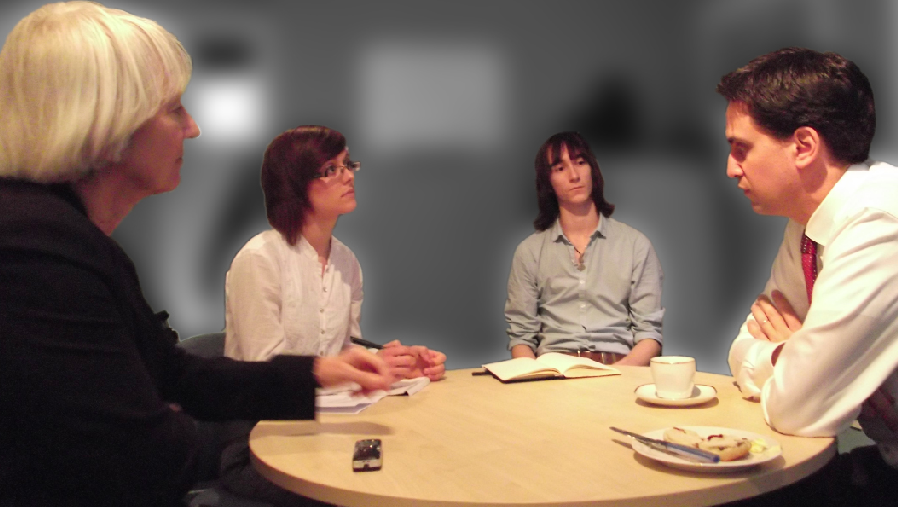Political editors Luke Slade & Sophie Gidley interview Ed Miliband in Cardiff at the opening of Jenny Rathbone’s new office
Contemplating an interview with Ed Miliband is rather daunting. After considering pages and pages of possible questions any sense of anxiety seems to disappear when youÔÇÖre finally in the room with him and he asks for a scone and cup of tea. He is, after all, just a man who so happens to be leader of the opposition.
Regardless of your political stance, it is difficult to deny the sense of reverence that surrounds Ed MilibandÔÇÖs character. Even at first glance, he commands a space and draws an interest.
After fulfilling other official engagements in Wales, he arrived in an undistinguished Ford to open a new office for Jenny Rathbone, Assembly Minister for Cardiff Central. Such a modest arrival from a leader who wants to be the working class hero.
His face through the passenger seat window was like a television screen moving through the street. The façade was broken when his driver stepped out of the car, a man no working class person would instantly warm to: tall, aloof and public school.
After the pomp and circumstance that entails from such an event, he made his way into a side room where he was to have an interview with a couple of humble political editors.
If it is possible to be both warm and brooding at the same time, then this is the impression Ed Miliband achieves, and it is much to his advantage. He is a tall man with slight hands but a firm handshake – a character of refreshing ambivalence.
As we took a seat, scone and tea served, we were curious to know why he chose the Labour Party, especially since, during his youth, his older brother, David, was already paving the way to becoming a politician.
ÔÇ£I grew up in a Labour household,ÔÇØ he said, taking a sip of tea, ÔÇ£so that obviously informs your politics.
ÔÇ£In the end I chose the Labour party, well not in the end, but because I believe in a fairer, more equal, more just society and I felt that Labour was the best party to achieve that.
ÔÇ£One of the foremost experiences for me when I was growing up was the minerÔÇÖs strike in 1984-85 when I was 14, which effected Wales a lot. I just felt there was such unfairness about what was being done to a specific group of workers who seemed to be fighting against the odds and not being listened to. So I think itÔÇÖs experiences like that which helped shape my politics and who I am.ÔÇØ
[pullquote]ÔÇ£The coalition refuses to change course even in the face of evidenceÔÇØ[/pullquote]We were keen to hear from LabourÔÇÖs relatively new leader about the direction of political rhetoric.┬á How much meaning is contained within short phrases such as: ÔÇ£ten years of Labour governmentÔÇØ, ÔÇ£same old ToriesÔÇØ, ÔÇ£time for changeÔÇØ and, more recently, from Ed Miliband ÔÇ£out of touchÔÇØ? Interested to know how Ed Miliband proposes that he is different from David Cameron, we questioned what truly separates the major parties.
ÔÇ£I think in the end you judge people on their deeds and not on their words,ÔÇØ he said, defending his use of ÔÇÿout of touchÔÇÖ.
ÔÇ£The thing I feel about the current government is theyÔÇÖve got to be out of touch to be doing what theyÔÇÖre doing. YouÔÇÖve got a million young people out of work and they are saying nothing can be done. Now, how out of touch with the needs of the country can you be when thatÔÇÖs the view that you take?
[pullquote]ÔÇ£I think the issue of intergenerational justice is going to be a huge issue of the next decadeÔÇØ[/pullquote]ÔÇ£I think ÔÇÿout of touchÔÇÖ, the notion of the Conservatives being out of touch, the idea of them being out of touch, is getting at something quite deep about the sense the country has that this is a government that just doesnÔÇÖt seem to be listening. It seems to be quite arrogant, quite high-handed in what it thinks and it doesnÔÇÖt seem to listen to people. It refuses to change course even in the face of evidence. Now, we use the phrase ÔÇÿout of touchÔÇÖ because I think that defines the way theyÔÇÖre going about what theyÔÇÖre doing.ÔÇØ
We had to press him here because the Coalition has been in power for only 18 months. Is it fair for Labour to be placing so much blame on the Coalition? Labour must surely assume some responsibility.
ÔÇ£I think they have made a dramatic change, but for the worse. I donÔÇÖt pretend that everything was easy when we were in power. We were coming off a big global recession and global difficulty yet we were trying to head things in the right direction. But then the Coalition came in, they took a big, big judgement, and made a big call which was that we need to just cut as far and as fast as we can and then it will all be okay. Now, clearly it was not okay and I think they were totally wrong in the first place. I think what has made it worse is that they think itÔÇÖs more important to stick to their failed plan than to say ÔÇÿwell actually maybe it hasnÔÇÖt worked out and weÔÇÖve got to change course.ÔÇÖ ThatÔÇÖs why we, the Labour party, have a duty to stand up for all of those people who are just feeling incredibly helpless in the face of what is happening.ÔÇØ
For us it is still not clear whether there is a palpable difference between Miliband and Cameron. Now more than ever, to fulfil the expectations of the British people, the blurring between party boundaries seems ever changing and less defined.  It seems that we have reached a stage where it is incredibly difficult for a party to gain an outright majority.
ÔÇ£I think the boundaries are much less blurred, actually, I think the boundaries have become much sharper. In a way some years ago people would have said that the boundaries have become more blurred. But I think, you know, David Cameron went through a phase of pretending to be a different kind of Tory but that turns out not to be the case.ÔÇØ
Has he in fact just confirmed what we were trying to assert? Cameron claims to be a new kind of Tory but Miliband claims to be taking Labour in a new direction. It appears that he is moving Labour forward, but what is difficult to tell is whether anything has really changed.
[pullquote]ÔÇ£YouÔÇÖve got to say young people should not be unemployed for more than six monthsÔÇØ[/pullquote]ÔÇ£I think the situation is so grave for the country it brings out differences between the parties. They say ÔÇÿlets keep on cutting, lets carry on with the plans weÔÇÖve gotÔÇÖ. We say totally different; youÔÇÖve got to actually inject some money into the economy to get it moving again. So there are big differences between the parties. IÔÇÖve got a strong view that weÔÇÖve got to change the way our society, the way our economy works, not just to go back to business as usual. We have to aspire to something much, much better, something quite different. So, I actually think the boundaries are not blurred. I think that this time, of all times, there are big choices that can be made about what happens in the country and where the country goes.ÔÇØ
With a whisper in our ears and only crumbs of scone left, we were allowed one last question, which of course had to be focused on graduate unemployment.
We know the worry surrounding our options after university. In a highly specialised society in which we have to study one specific degree, are we almost too highly educated where a degree alone is now simply not enough?
ÔÇ£This is inevitably a consequence of more people going to universities. So when five per cent of people went to universities it was a very unusual thing. Now 35 to 40 per cent of people go to university and I personally think thatÔÇÖs a good thing, not a bad thing.
ÔÇ£What you have to do is create the jobs for graduates. One in five graduates are currently doing a job which doesnÔÇÖt require a graduate skill and so youÔÇÖve got to create those jobs. I think youÔÇÖve got to get the economy moving to be able to do that.
ÔÇ£Secondly, youÔÇÖve got to have proper opportunities for people who donÔÇÖt go to university. People used to think that vocational training and apprenticeships were all out of date, itÔÇÖs all for the past, itÔÇÖs all heavy manufacturing. It isnÔÇÖt and people who thought that were wrong to think that. I think youÔÇÖve got to have proper career pathways for both sets of people.ÔÇØ
But our point was that with the current state of the job market, people are forced to gain a higher education and to choose a specific pathway early on. However, this seems to cut off other choices because once youÔÇÖre in that careerÔÇÖs slipstream and find that you canÔÇÖt get a job, there are limited options.
ÔÇ£Look, I think being a young person today holds huge opportunities. I think the issue of intergenerational justice is going to be a huge issue of the next decade. In other words: what is this generation doing to make sure that life is fair for the generation coming up, so that you donÔÇÖt end up with ┬ú9,000 tuition fees, no jobs, and unable to get on the housing ladder.
ÔÇ£I think itÔÇÖs a massive, massive challenge. I think, you know, the good news is that there are more opportunities than ever for young people. Even when I went to university 20 years ago I donÔÇÖt think I would have thought about doing what people today think about doing, like going to the developing world for instance. I think the horizons have broadened massively, but the challenges are just as massive for this generation.ÔÇØ
Interrupting his rather general answer we compelled him to specify. ItÔÇÖs all very well talking about the challenges that young people face but how do we actually address them?
ÔÇ£Look, youÔÇÖve got to do two things. YouÔÇÖve got to get the economy moving and generally getting the economy moving will help graduates. Secondly, youÔÇÖve got to say young people should not be unemployed for more than six months.
ÔÇ£We have something called The Future Jobs Fund which helps graduates and non-graduates. A recent report came out about what it had done in creative industries and three-quarters of the people went on to get long-term jobs afterwards. You canÔÇÖt accept young people, graduates and non-graduates, being unemployed.
ÔÇ£You know, IÔÇÖve got this phrase, ÔÇÿthe promise of BritainÔÇÖ, which is the idea that the next generation does better than the last and I think that is really under threat. ThatÔÇÖs where politics comes in, thatÔÇÖs why politics does make a difference.ÔÇØ





Add Comment